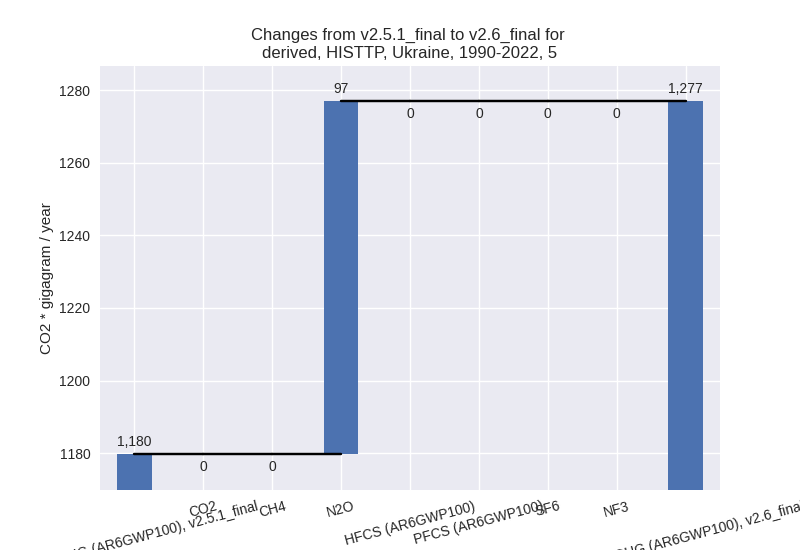Changes in PRIMAP-hist v2.6_final compared to v2.5.1_final for Ukraine
2024-09-24
Johannes Gütschow
Change analysis for Ukraine for PRIMAP-hist v2.6_final compared to v2.5.1_final
Overview over emissions by sector and gas
The following figures show the aggregate national total emissions excluding LULUCF AR6GWP100 for the country reported priority scenario. The dotted linesshow the v2.5.1_final data.
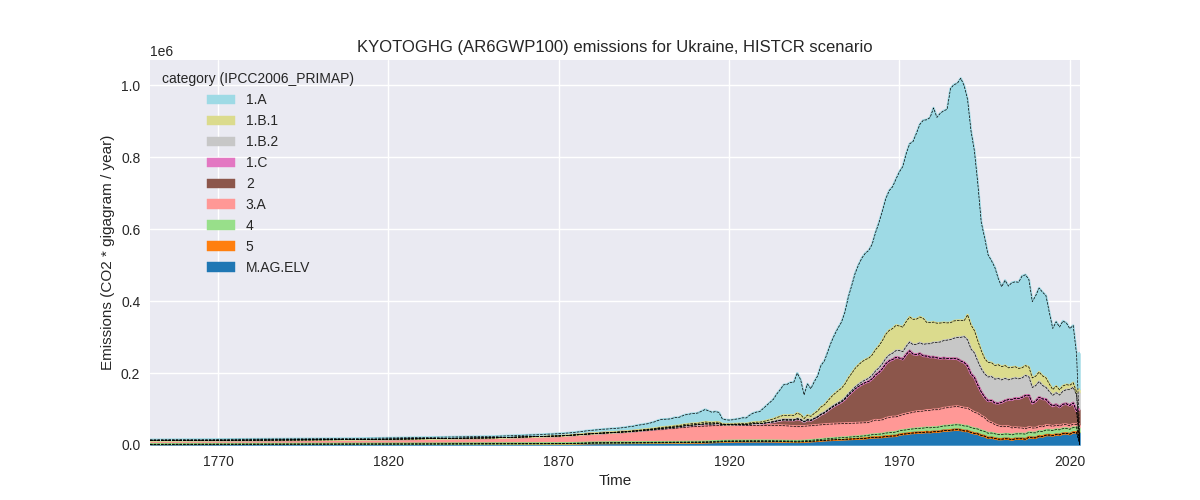
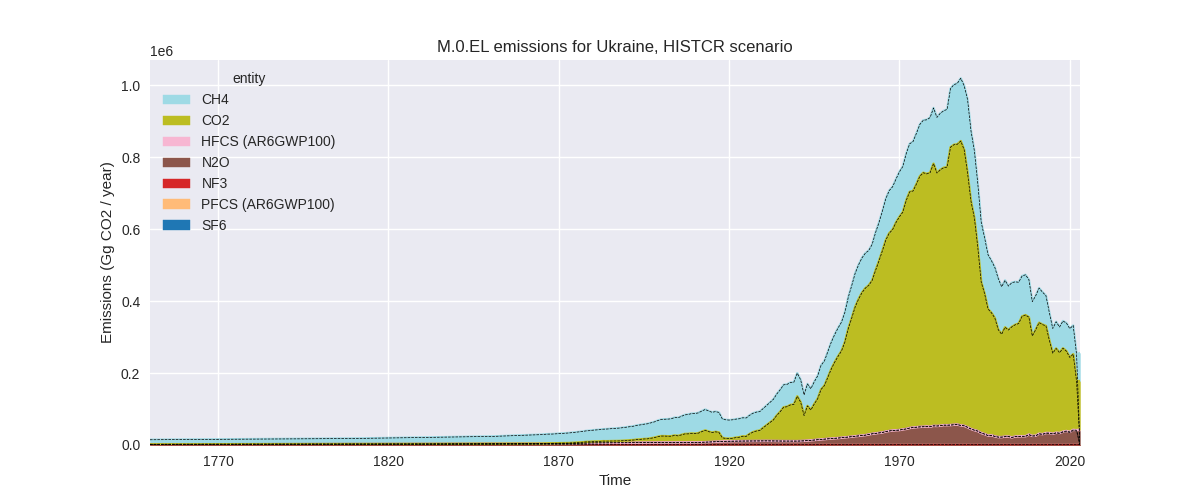
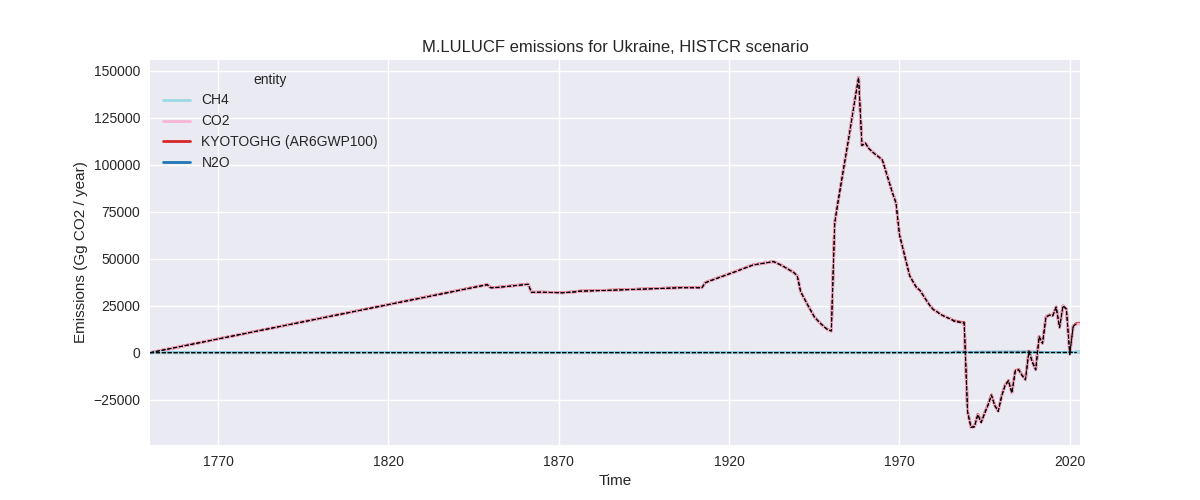
The following figures show the aggregate national total emissions excluding LULUCF AR6GWP100 for the third party priority scenario. The dotted linesshow the v2.5.1_final data.
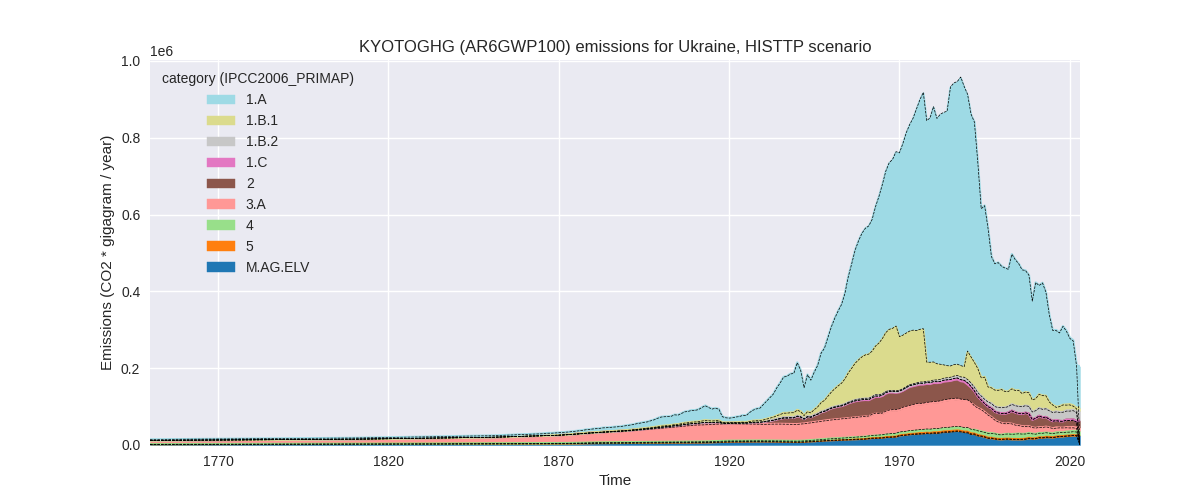
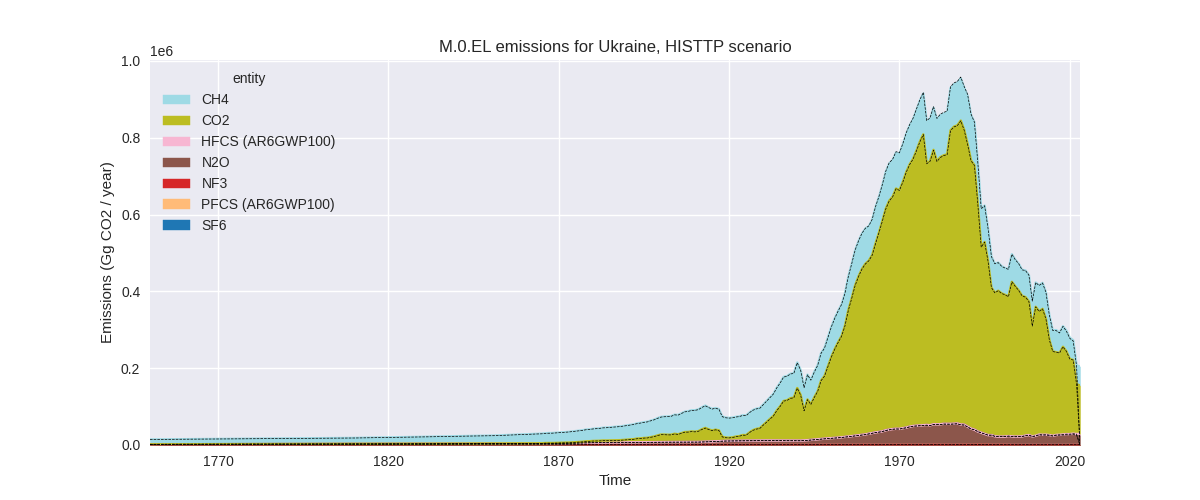
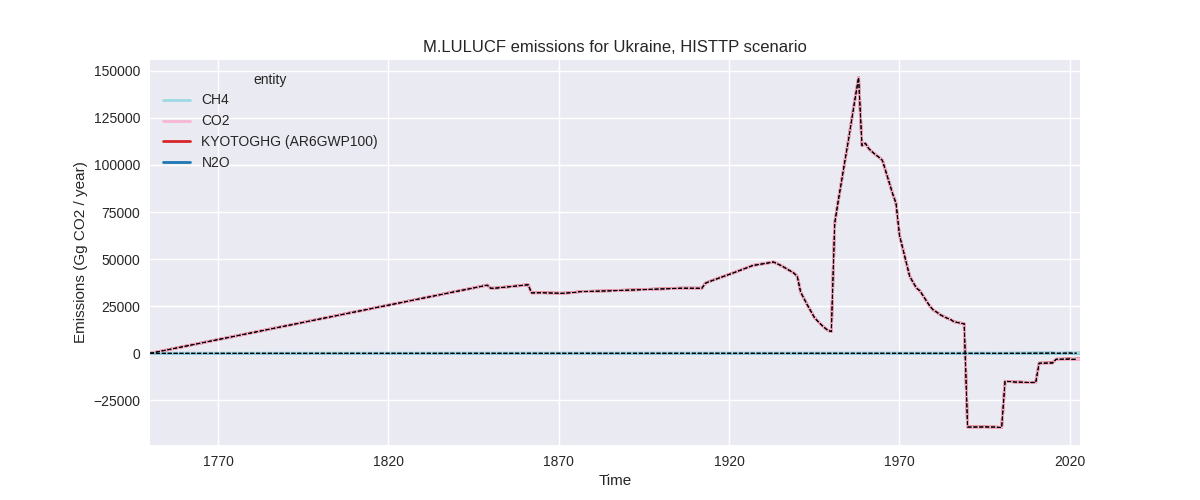
Overview over changes
In the country reported priority scenario we have the following changes for aggregate Kyoto GHG and national total emissions excluding LULUCF (M.0.EL):
- Emissions in 2022 have changed by 0.3%% (741.03 Gg CO2 / year)
- Emissions in 1990-2022 have changed by 0.0%% (22.86 Gg CO2 / year)
In the third party priority scenario we have the following changes for aggregate Kyoto GHG and national total emissions excluding LULUCF (M.0.EL):
- Emissions in 2022 have changed by 1.3%% (2703.72 Gg CO2 / year)
- Emissions in 1990-2022 have changed by 0.0%% (158.79 Gg CO2 / year)
Most important changes per scenario and time frame
In the country reported priority scenario the following sector-gas combinations have the highest absolute impact on national total KyotoGHG (AR6GWP100) emissions in 2022 (top 5):
- 1: 1.A, CO2 with 566.25 Gg CO2 / year (0.6%)
- 2: 2, HFCS (AR6GWP100) with 101.17 Gg CO2 / year (4.4%)
- 3: 1.B.2, CO2 with 70.32 Gg CO2 / year (5.1%)
- 4: 2, SF6 with 1.19 Gg CO2 / year (2.0%)
- 5: 2, PFCS (AR6GWP100) with 0.00 Gg CO2 / year (0.0%)
In the country reported priority scenario the following sector-gas combinations have the highest absolute impact on national total KyotoGHG (AR6GWP100) emissions in 1990-2022 (top 5):
- 1: 1.A, CO2 with 17.16 Gg CO2 / year (0.0%)
- 2: 2, HFCS (AR6GWP100) with 3.07 Gg CO2 / year (0.5%)
- 3: 1.B.2, CO2 with 2.13 Gg CO2 / year (0.1%)
- 4: 2, SF6 with 0.04 Gg CO2 / year (0.3%)
- 5: 2, PFCS (AR6GWP100) with 0.00 Gg CO2 / year (0.0%)
In the third party priority scenario the following sector-gas combinations have the highest absolute impact on national total KyotoGHG (AR6GWP100) emissions in 2022 (top 5):
- 1: 4, CH4 with 1875.24 Gg CO2 / year (21.6%)
- 2: 1.A, CO2 with 585.97 Gg CO2 / year (0.5%)
- 3: 2, HFCS (AR6GWP100) with 233.28 Gg CO2 / year (9.5%)
- 4: 4, N2O with 87.71 Gg CO2 / year (15.3%)
- 5: 5, N2O with -75.54 Gg CO2 / year (-11.8%)
In the third party priority scenario the following sector-gas combinations have the highest absolute impact on national total KyotoGHG (AR6GWP100) emissions in 1990-2022 (top 5):
- 1: 5, N2O with 97.22 Gg CO2 / year (8.2%)
- 2: 4, N2O with 24.37 Gg CO2 / year (3.5%)
- 3: 4, CH4 with 19.53 Gg CO2 / year (0.2%)
- 4: 1.A, CO2 with 17.01 Gg CO2 / year (0.0%)
- 5: 2, HFCS (AR6GWP100) with 7.07 Gg CO2 / year (1.1%)
Notes on data changes
No country specific notes present for this changelog.
Changes by sector and gas
For each scenario and time frame the changes are displayed for all individual sectors and all individual gases. In the sector plot we use aggregate Kyoto GHGs in AR6GWP100. In the gas plot we usenational total emissions without LULUCF. ## country reported scenario
2022
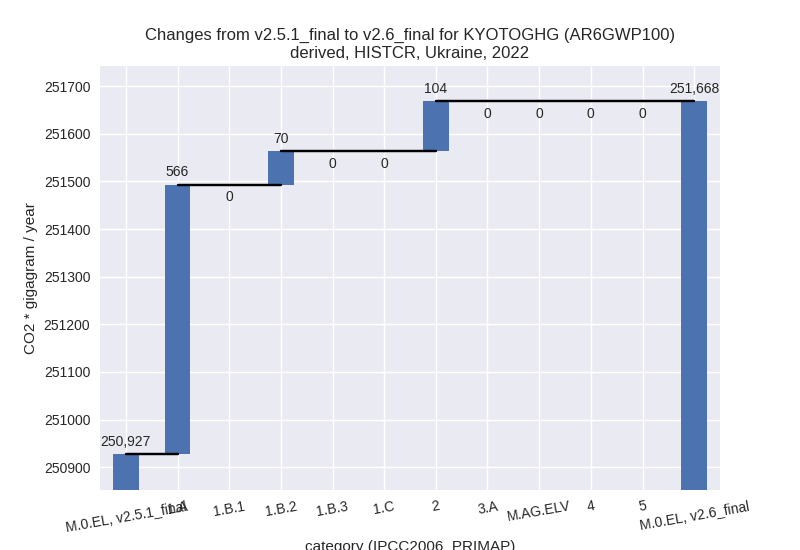
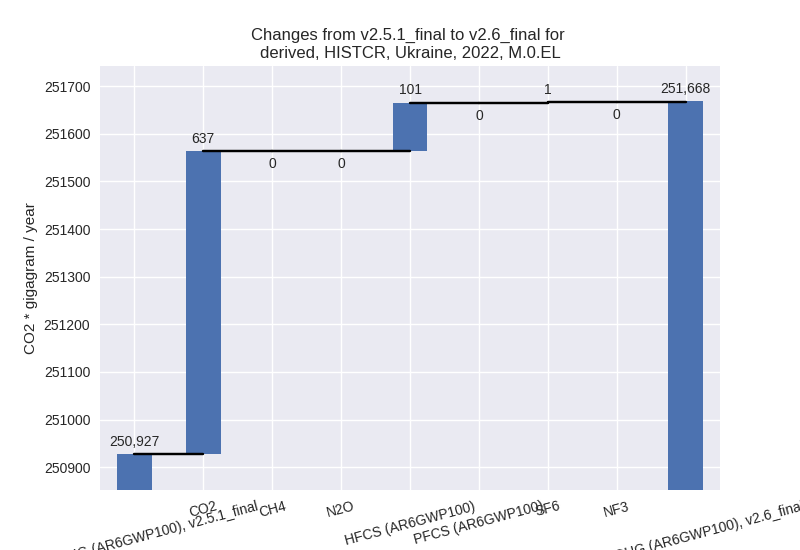
1990-2022
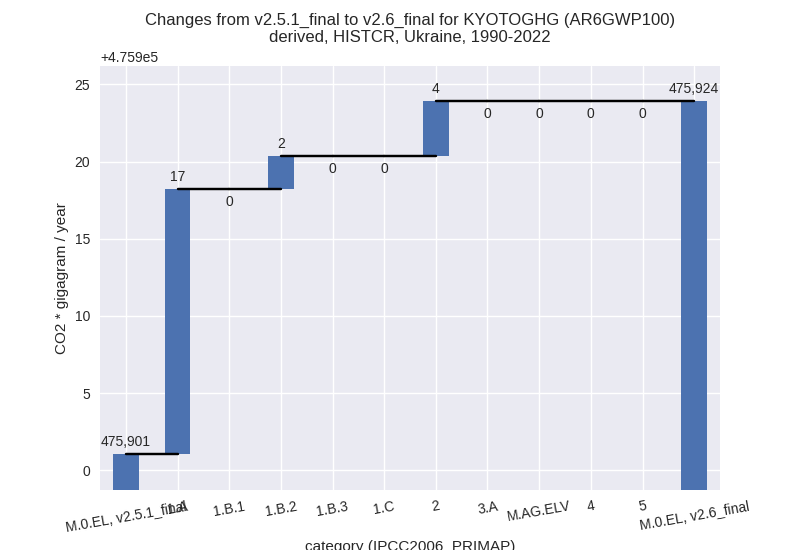
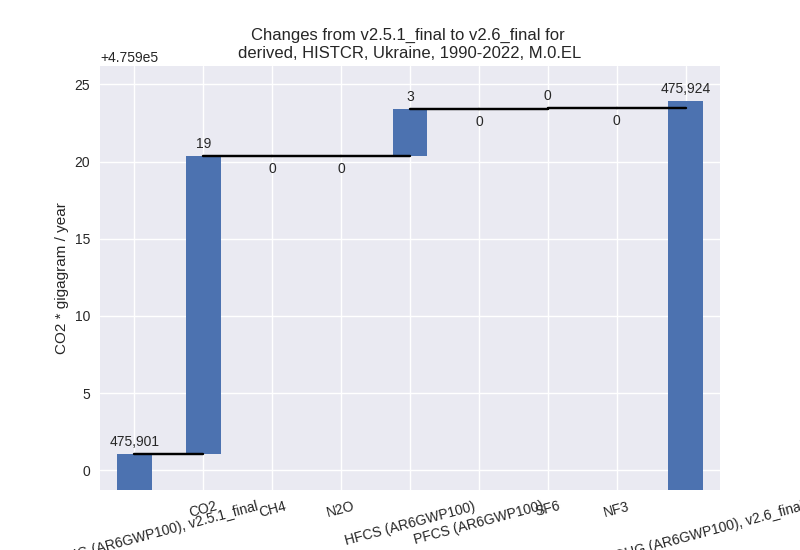
third party scenario
2022
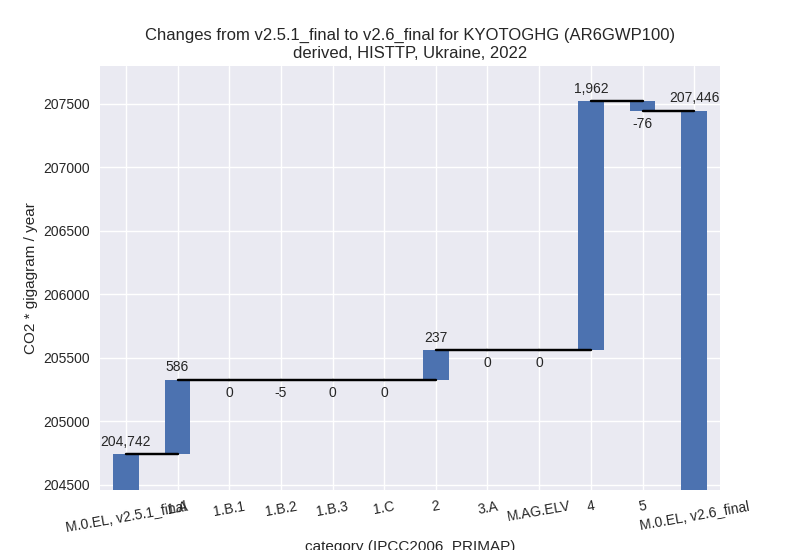
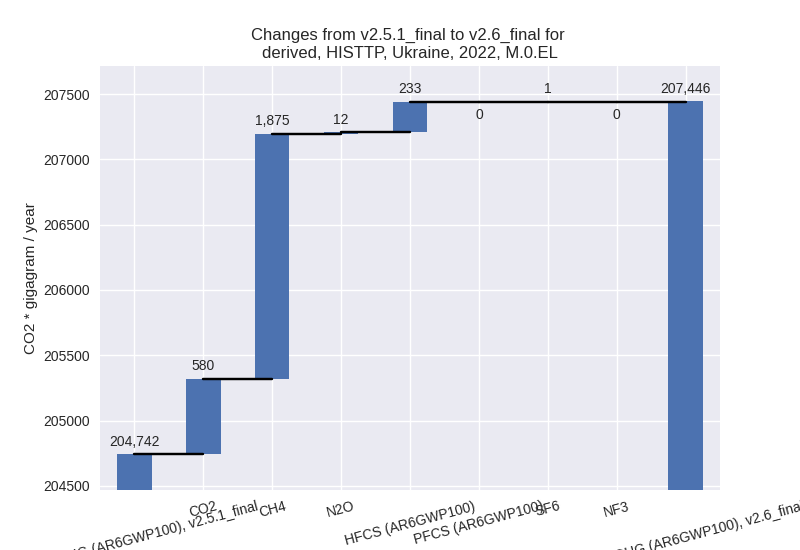
1990-2022
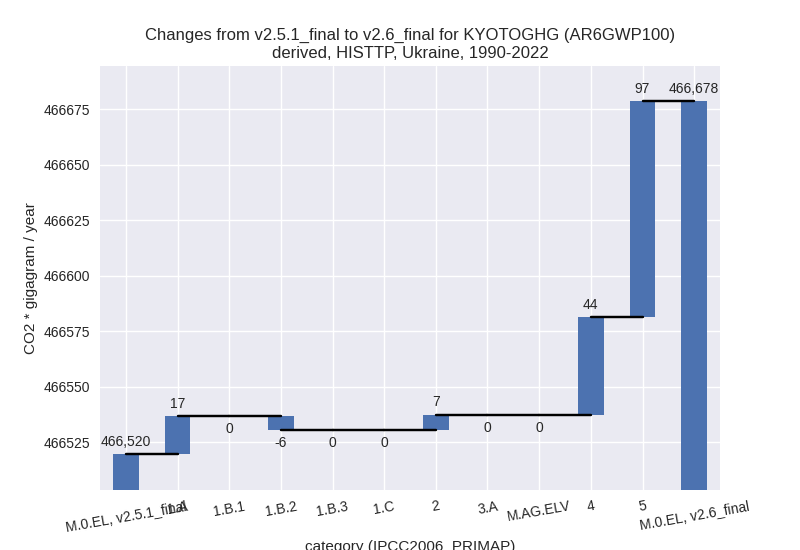
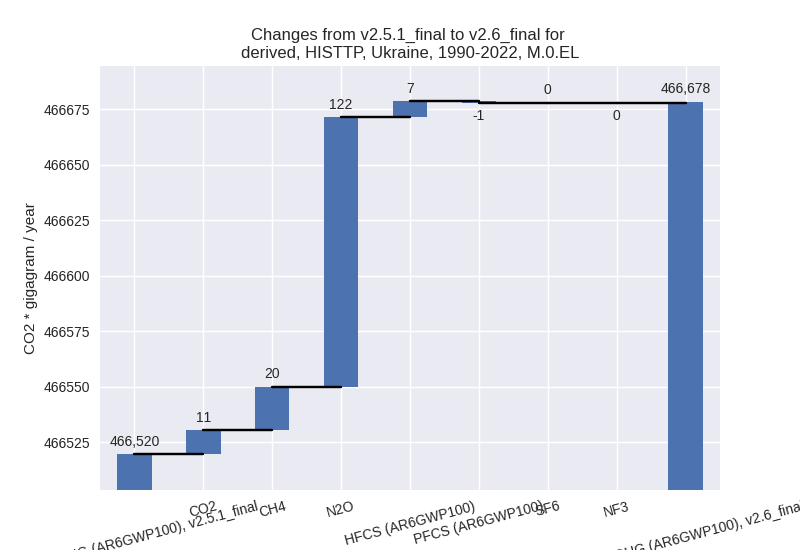
Detailed changes for the scenarios:
country reported scenario (HISTCR):
Most important changes per time frame
For 2022 the following sector-gas combinations have the highest absolute impact on national total KyotoGHG (AR6GWP100) emissions in 2022 (top 5):
- 1: 1.A, CO2 with 566.25 Gg CO2 / year (0.6%)
- 2: 2, HFCS (AR6GWP100) with 101.17 Gg CO2 / year (4.4%)
- 3: 1.B.2, CO2 with 70.32 Gg CO2 / year (5.1%)
- 4: 2, SF6 with 1.19 Gg CO2 / year (2.0%)
- 5: 2, PFCS (AR6GWP100) with 0.00 Gg CO2 / year (0.0%)
For 1990-2022 the following sector-gas combinations have the highest absolute impact on national total KyotoGHG (AR6GWP100) emissions in 1990-2022 (top 5):
- 1: 1.A, CO2 with 17.16 Gg CO2 / year (0.0%)
- 2: 2, HFCS (AR6GWP100) with 3.07 Gg CO2 / year (0.5%)
- 3: 1.B.2, CO2 with 2.13 Gg CO2 / year (0.1%)
- 4: 2, SF6 with 0.04 Gg CO2 / year (0.3%)
- 5: 2, PFCS (AR6GWP100) with 0.00 Gg CO2 / year (0.0%)
Changes in the main sectors for aggregate KyotoGHG (AR6GWP100) are
- 1: Total sectoral emissions in 2022 are 156811.71 Gg CO2 / year which is 62.3% of M.0.EL emissions. 2022 Emissions have changed by 0.4% (636.58 Gg CO2 / year). 1990-2022 Emissions have changed by 0.0% (19.29 Gg CO2 / year).
- 2: Total sectoral emissions in 2022 are 38120.47 Gg CO2 / year which is 15.1% of M.0.EL emissions. 2022 Emissions have changed by 0.3% (104.44 Gg CO2 / year). 1990-2022 Emissions have changed by 0.0% (3.57 Gg CO2 / year).
- M.AG: Total sectoral emissions in 2022 are 43272.05 Gg CO2 / year which is 17.2% of M.0.EL emissions. 2022 Emissions have changed by 0.0% (0.00 Gg CO2 / year). 1990-2022 Emissions have changed by 0.0% (0.00 Gg CO2 / year).
- 4: Total sectoral emissions in 2022 are 13464.07 Gg CO2 / year which is 5.3% of M.0.EL emissions. 2022 Emissions have changed by 0.0% (0.00 Gg CO2 / year). 1990-2022 Emissions have changed by 0.0% (0.00 Gg CO2 / year).
- 5: No data
third party scenario (HISTTP):
Most important changes per time frame
For 2022 the following sector-gas combinations have the highest absolute impact on national total KyotoGHG (AR6GWP100) emissions in 2022 (top 5):
- 1: 4, CH4 with 1875.24 Gg CO2 / year (21.6%)
- 2: 1.A, CO2 with 585.97 Gg CO2 / year (0.5%)
- 3: 2, HFCS (AR6GWP100) with 233.28 Gg CO2 / year (9.5%)
- 4: 4, N2O with 87.71 Gg CO2 / year (15.3%)
- 5: 5, N2O with -75.54 Gg CO2 / year (-11.8%)
For 1990-2022 the following sector-gas combinations have the highest absolute impact on national total KyotoGHG (AR6GWP100) emissions in 1990-2022 (top 5):
- 1: 5, N2O with 97.22 Gg CO2 / year (8.2%)
- 2: 4, N2O with 24.37 Gg CO2 / year (3.5%)
- 3: 4, CH4 with 19.53 Gg CO2 / year (0.2%)
- 4: 1.A, CO2 with 17.01 Gg CO2 / year (0.0%)
- 5: 2, HFCS (AR6GWP100) with 7.07 Gg CO2 / year (1.1%)
Changes in the main sectors for aggregate KyotoGHG (AR6GWP100) are
- 1: Total sectoral emissions in 2022 are 145977.41 Gg CO2 / year which is 70.4% of M.0.EL emissions. 2022 Emissions have changed by 0.4% (580.66 Gg CO2 / year). 1990-2022 Emissions have changed by 0.0% (10.80 Gg CO2 / year).
- 2: Total sectoral emissions in 2022 are 16679.98 Gg CO2 / year which is 8.0% of M.0.EL emissions. 2022 Emissions have changed by 1.4% (236.53 Gg CO2 / year). 1990-2022 Emissions have changed by 0.0% (6.86 Gg CO2 / year).
- M.AG: Total sectoral emissions in 2022 are 32985.56 Gg CO2 / year which is 15.9% of M.0.EL emissions. 2022 Emissions have changed by 0.0% (0.00 Gg CO2 / year). 1990-2022 Emissions have changed by 0.0% (0.00 Gg CO2 / year).
- 4: Total sectoral emissions in 2022 are 11239.08 Gg
CO2 / year which is 5.4% of M.0.EL emissions. 2022 Emissions have
changed by 21.1% (1962.07 Gg CO2 /
year). 1990-2022 Emissions have changed by 0.4% (43.92 Gg CO2 / year). For 2022 the
changes per gas
are:
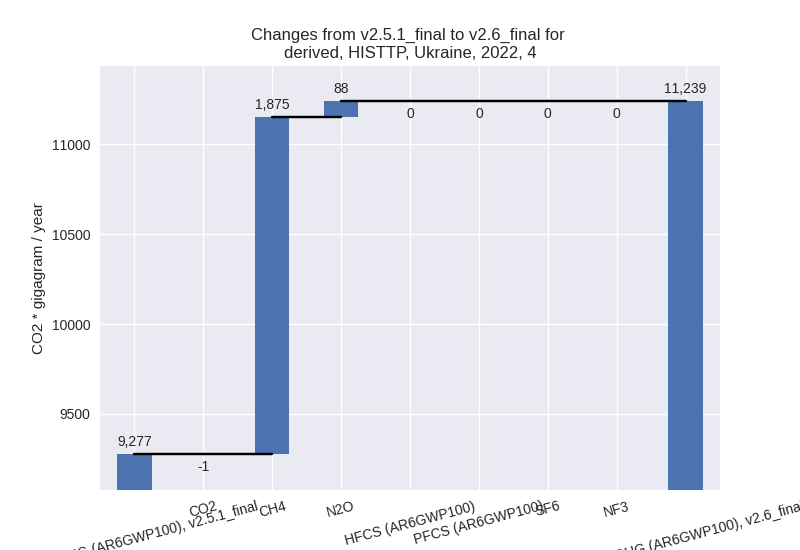
- 5: Total sectoral emissions in 2022 are 563.52 Gg
CO2 / year which is 0.3% of M.0.EL emissions. 2022 Emissions have
changed by -11.8% (-75.54 Gg CO2 /
year). 1990-2022 Emissions have changed by 8.2% (97.22 Gg CO2 / year). For 2022 the
changes per gas
are:
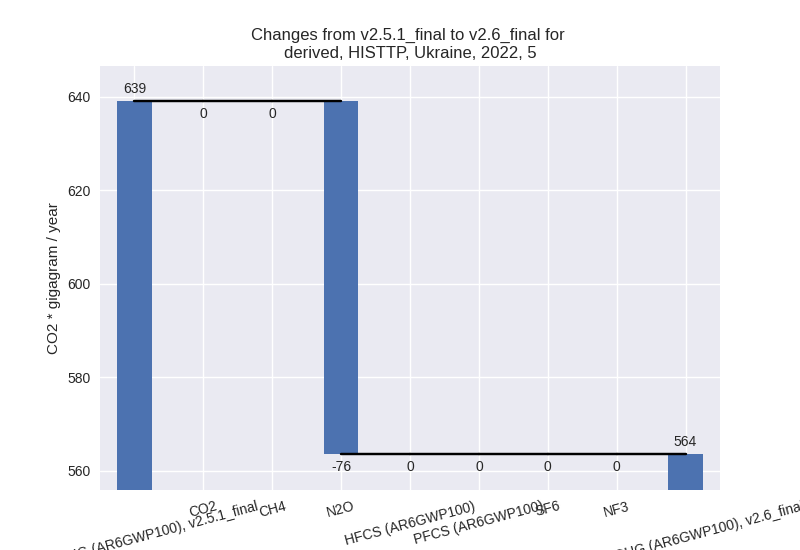
For 1990-2022 the changes per gas are: